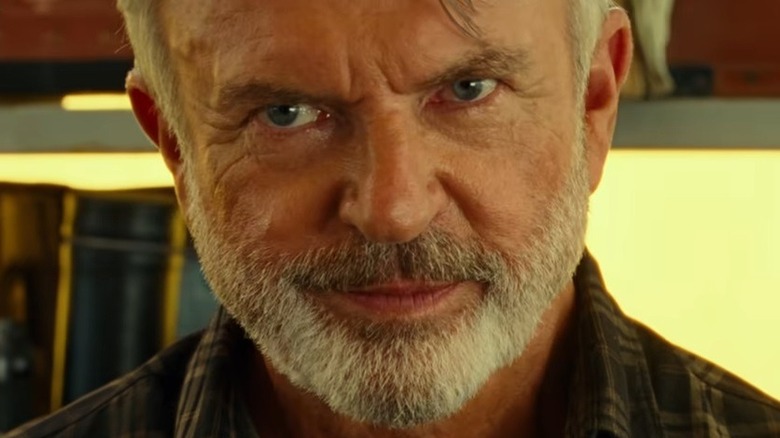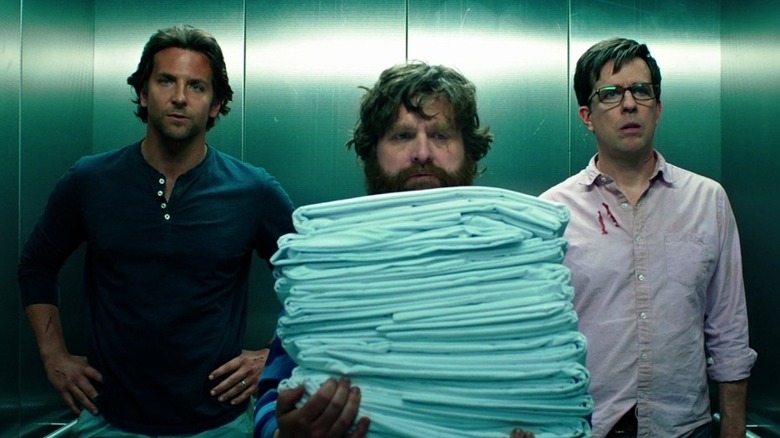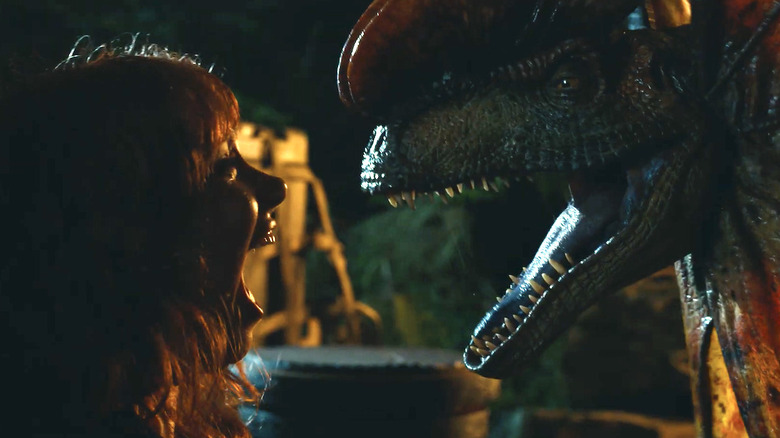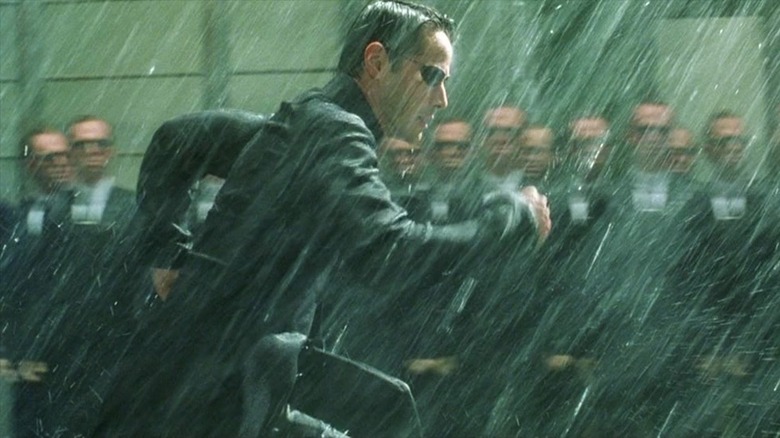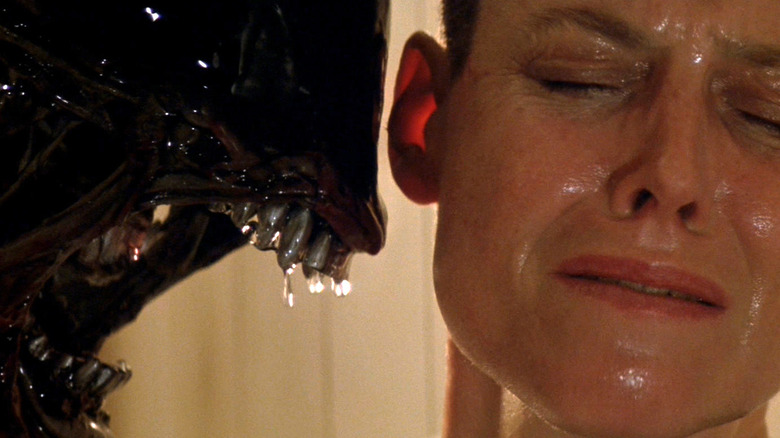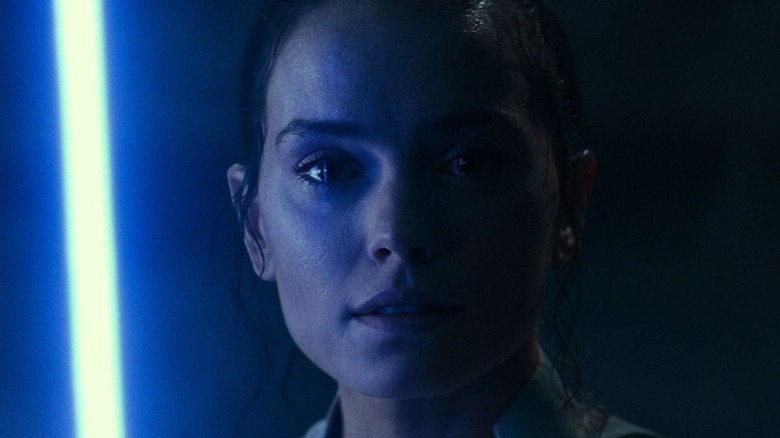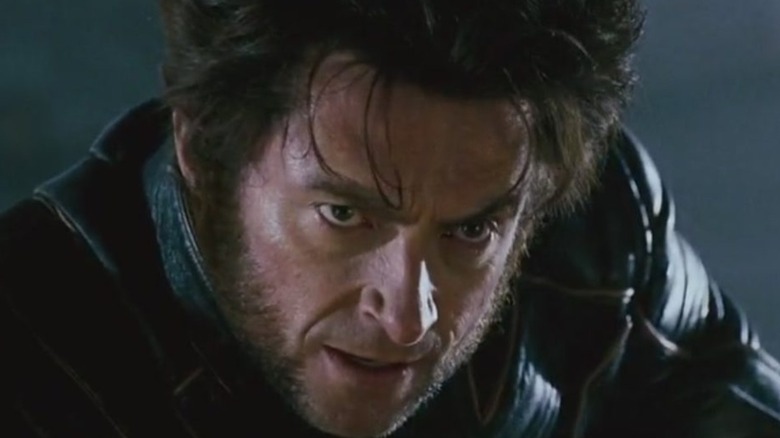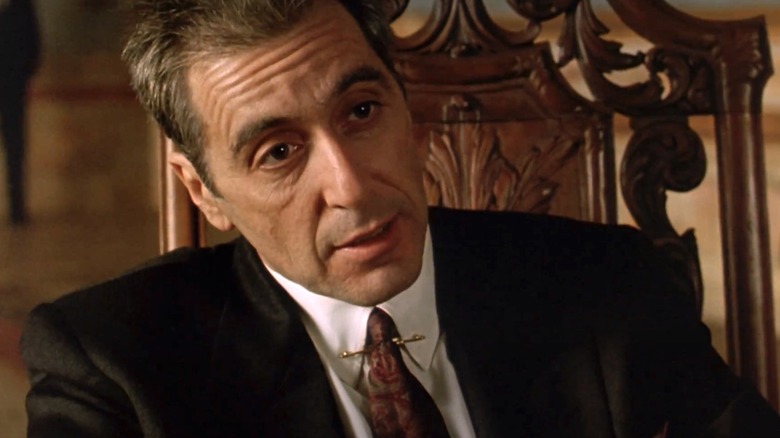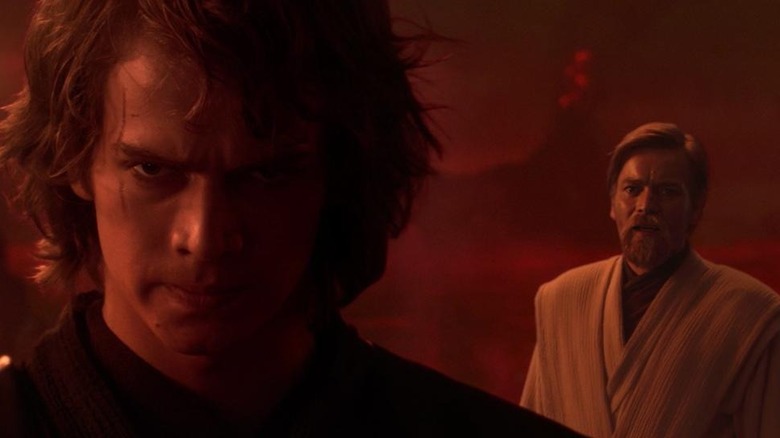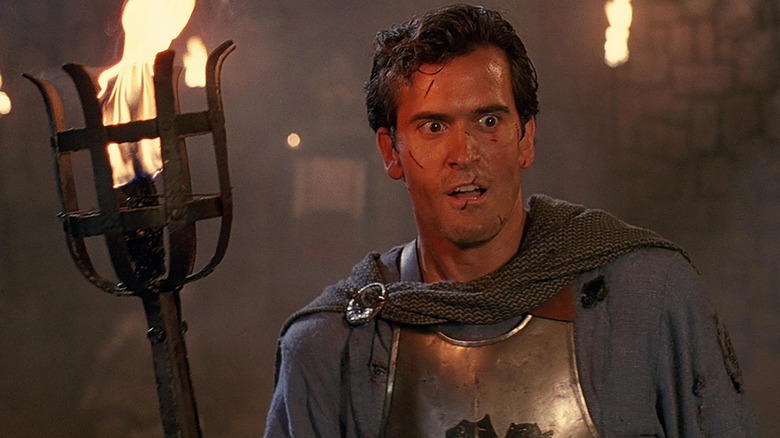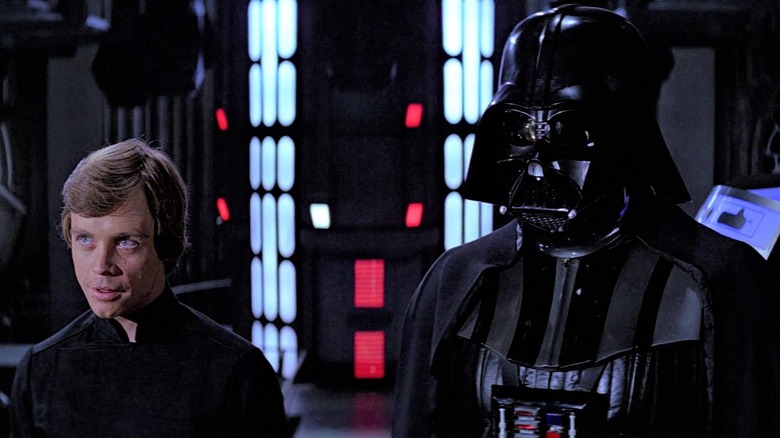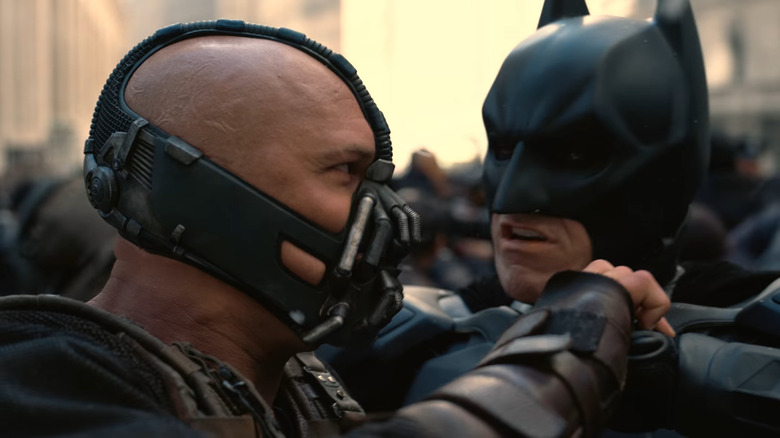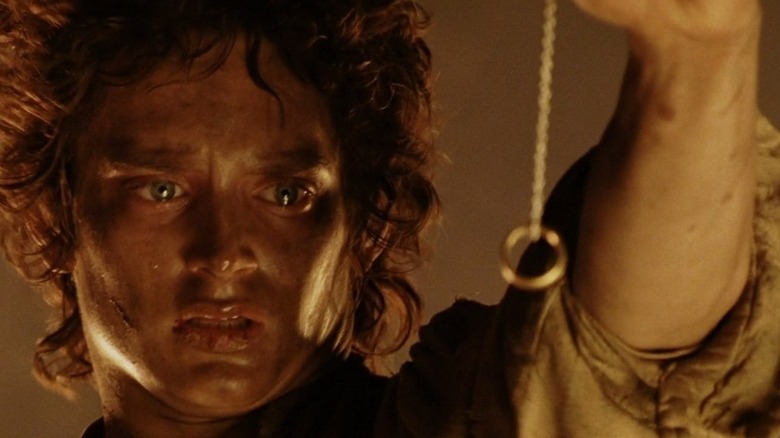Ranking Trilogy Conclusions From Worst To Best
Why do we love trilogies so much? Probably because they follow the traditional three-act story structure that's worked for thousands of years — setup, confrontation, resolution. Of course, not all trilogies are created equal, especially when it comes to that third and final chapter. A trilogy conclusion is a tricky thing to do right. For whatever reason, filmmakers tend to run out of gas after two films, so there have been a lot of bad trilogy conclusions. However, movie fans shouldn't be reflexively cynical about trilogies, as many third films have turned out to be amazing, and we're here to figure out which ones did justice to their respective series.
But what do we mean by trilogy conclusion? Well, we're talking about third films that complete a franchise's three-film story arc. So we won't be looking at movies that didn't conclude a three-film storyline but were simply the third film in the series — no "Batman Forever," "Superman III," or "Die Hard with a Vengeance." However, we will be looking at films in franchises that continued past part three if the original story arc was completed with the third movie. So which trilogy conclusions did their series harm, and which ones prove that third time's the charm? Here are trilogy conclusions ranked from worst to best.
12. The Hangover Part III
"The Hangover" was a surprise hit in 2009, winning strong scores from critics and moviegoers and earning $465 million worldwide. Two years later, "The Hangover Part II" used the goodwill from the first film to earn $586 million worldwide, but both critics and moviegoers were no longer feeling the buzz from the original. "The Hangover" succeeded because it was an old-school raunchy comedy, basically if the "American Pie" crew grew up and had a bachelor party in Las Vegas. While its over-the-top story wasn't "realistic," it was believable. "The Hangover Part II” threw that out the window, stretching the audience's credulity and its appetite for crude, nasty humor.
While we're sure the producers would have gladly made "Hangover" movies until the audience stopped showing up, the concept had been stretched thin, and the party had to end sometime. Thus, "The Hangover Part III" was a trilogy capper and marketed with the tagline "it all ends." Good thing it did. Despite concluding a series that started with one of the most popular comedies of the 21st century, "The Hangover Part III" borders on being an angry, dark thriller with its story of the Wolfpack traveling to Las Vegas to rescue loose cannon Alan. Moviegoers and critics weren't impressed based on the abysmal reviews, while the film's $362 million worldwide box office gross was a steep drop from previous entries. If you're looking for a trilogy to binge, choose something more sober than "The Hangover" franchise.
11. Jurassic World Dominion
Dinosaurs have been extinct for 65 million years, but you may not know that after taking a look at our pop culture. A big reason for that is the "Jurassic Park" and "Jurassic World" franchises. The series has been going strong since Steven Spielberg's "Jurassic Park" in 1993. Nearly 30 years and five films later, it concluded with "Jurassic World Dominion" in 2022. While the series took a 14-year hiatus after "Jurassic Park III," this was just the third film and not a proper trilogy conclusion, as Universal planned to produce a fourth film featuring human-dino hybrids (we're glad that sequel never happened). Instead, we got the franchise relaunch "Jurassic World," part of a string of legacy sequels that Hollywood's given us over the years.
It turned out pretty well, with "Jurassic World" earning $1.6 billion worldwide. Seven years later we got "Jurassic World Dominion," the would-be conclusion to the three-film "Jurassic World" arc and the series as a whole. We're skeptical Universal will ever let this series go completely extinct, as it has currently banked $5.3 billion worldwide and counting. We suspect they're just gearing up for another spinoff — maybe "Jurassic Planet," "Jurassic Universe," or "Fast and the Cretaceous?" However, the tagline for "Jurassic World Dominion" makes clear that this is "The Epic Conclusion to the Jurassic Era." And perhaps that's for the best, as critically speaking, it's the worst-reviewed movie in the franchise ... even worse than the much-maligned "Jurassic Park III." Perhaps that has to do with the weird emphasis on giant locusts as opposed to dinosaurs, the uninspired action sequences, and the film's overreliance on nostalgia.
10. The Matrix Revolutions
"The Matrix" revolutionized action cinema in 1999. "The Matrix Revolutions” ended the series on a sour note. The original film earned the best reviews of the series and made it seem like the franchise was on its way to being the next "Star Wars" — a science fiction franchise that crossed over into the mainstream and became a beloved trilogy. Yeah, not so much. The much-anticipated 2003 sequel "The Matrix Reloaded" earned $738 million worldwide, the franchise's biggest box office gross and nearly $300 million more than the original, but it also left moviegoers confused and underwhelmed. "The Empire Strikes Back" it was not. Instead, it was just another blockbuster with generic action in an era packed with them.
So the anticipation just wasn't there for the trilogy conclusion, "The Matrix Revolutions," especially since it was released a mere six months later. Maybe if the Wachowskis had more time to contemplate and fix what went wrong with "Reloaded," things would have turned out differently with "Revolutions." Alas, "The Matrix Revolutions" scored poorly with critics and fans, receiving the worst reviews of the franchise and earning $300 million less than "The Matrix Reloaded," which came out just a few months earlier. Its disappointing influence is still felt to this day. Despite solid reviews, "The Matrix Resurrections" was a legacy sequel that tanked at the box office, largely due to fan apathy from "The Matrix Revolutions."
9. Alien 3
You know your movie is bad when the director disowns it. David Fincher essentially did just that, referring to "Alien 3" in a "Vulture" interview as "a library title for a multinational, vertically integrated media conglomerate." That may be the most politically correct way of saying "I hated making this movie" we've ever heard. While Fincher belongs in the same conversation as "Alien" director Ridley Scott and "Aliens" director James Cameron now, he was just a well-regarded music video director at the time, with "Alien 3" being his first feature film. He certainly had big space-boots to fill.
The first two films are considered near-perfect masterpieces by critics and fans, and most importantly to movie studio 20th Century Fox, they made a lot of money at the box office. But if Fincher expected the same creative freedom that Scott and Cameron enjoyed, he was disappointed. Thanks to studio interference, the result is a disjointed film that lacks the original's scares and the sequel's thrills, and it feels like a half-baked effort with too many cooks in the kitchen. It boasts bad reviews from critics and moviegoers, though its $158 million was enough to convince Fox to give the series another go with 1997's "Alien Resurrection." But make no mistake, "Alien 3" was meant to be the series' swan song, as Lt. Ellen Ripley dies after plunging into molten steel.
8. Star Wars: The Rise of Skywalker
What if you had to conclude not just one trilogy but a nine-film franchise? And what if that movie had to retcon the backlash of the previous film? And what if the franchise you're concluding is the "Star Wars" saga, one of the most successful and beloved series of all time? It almost makes you feel sorry for J.J. Abrams ... well, if "Star Wars: The Rise of Skywalker" wasn't so dang disappointing.
Following 2017's controversial "The Last Jedi," which was a big hit with critics but not with moviegoers, and the commercial failure of "Solo: A Star Wars Story," Disney did damage control. The Mouse House brought back Abrams, whose "Star Wars: The Force Awakens" is still the highest-grossing domestic release ever. Surely Abrams would be able to end this story effectively, right? Clearly Disney never watched "Lost" or the "Star Trek" reboot.
Released in 2019, "The Rise of Skywalker" earned poor reviews from critics. Moviegoers kind of liked it, they just didn't show up in record numbers, as it earned just a little over $1 billion worldwide, barely beating the "Star Wars" spinoff "Rogue One" and grossing less than its two "Skywalker Saga" predecessors. "The Rise of Skywalker" felt less like a labor of love and more like a rush job, one that had to deal with the death of Carrie Fisher while actively undoing plot points set up in Rian Johnson's previous film. So, its failure wasn't surprising considering the circumstances but disappointing considering this was the conclusion to "Star Wars."
7. X-Men: The Last Stand
Bryan Singer helped launch the modern superhero movie renaissance with his first two X-Men films, "X-Men" and "X2: X-Men United." With reviews as strong as adamantium and nearly $700 million in global box office, Singer seemed poised to finish off his "X-Men" trilogy with a bang, but then he decided to go do "Superman Returns" instead. Well, when you can't get Bryan Singer, you hire ... Brett Ratner? While it didn't make sense from a creative standpoint based on Ratner's filmography, he was quick and bankable, two things movie studio 20th Century Fox needed after Singer's unexpected departure.
"X-Men: The Last Stand" was ... well ... not great, with so-so scores from critics and fans, which was especially disappointing given how universally praised the first two films were. "X-Men: The Last Stand" was overstuffed, attempting to not only finish the trilogy but cram both the "Dark Phoenix" and the "Mutant Cure" storylines into 1 hour and 45 minutes. However, it did make money, $459 million to be exact, the most in the series at that point and about $60 million more than Singer's "Superman Returns."
However, Singer got the last laugh. He returned to the series for 2014's "X-Men: Days of Future Past," which not only made more than any other "X-Men" movie (besides the "Deadpool" spinoffs) but also retconned "X-Men: The Last Stand" out of existence. So is the movie still disappointing if it didn't happen?
6. The Godfather Part III
While "The Godfather Part III" is not the worst film on our list, it is probably the most disappointing. It's one thing to be a mediocre conclusion to a solid series. It's another to be a mediocre movie when your predecessors are considered two of the greatest movies of all time — "The Godfather" and "The Godfather Part II." Francis Ford Coppola made a pretty much perfect movie in 1972 with "The Godfather," and then he did the impossible and made another near-perfect movie in 1974 with "The Godfather Part II."
Then, over 15 years later, Coppola was in financial straits and really needed some cash. So when he was offered a chance to see what Michael Corleone and the gang were up to in "The Godfather Part III," he couldn't ... well, you know. Released in 1990, the film's critics and audience scores are pretty mediocre thanks to its convoluted storyline and poor performances. Coppola's daughter Sofia earned most of the backlash, as the non-actress was a last-minute replacement for Winona Ryder (via Indiewire). With a directing Oscar of her own, we'd say Sofia's reputation has turned out okay. "The Godfather Part III" has not, as its reputation has only diminished over the past 30 years, with its Best Picture nomination seeming more like a head-scratching honorable mention than a mark of quality.
5. Star Wars: Revenge of the Sith
Fans had waited nearly 20 years for a new "Star Wars" movie after "Return of the Jedi." What they got was "The Phantom Menace" and "Attack of the Clones," two of the worst-reviewed movies in the entire franchise. Following those two luke(Skywalker)warm entries, George Lucas had to take on what was undoubtedly the most daunting of the prequel trilogy — the story of Darth Vader in "Revenge of the Sith."
Vader is the best "Star Wars" villain and one of the best movie villains period. Even though "The Phantom Menace" and "Attack of the Clones" had disappointed, fans still held out hope — you might say, "A New Hope" — for Vader's origin story. And while "Star Wars" fans are notoriously tough to please, "Revenge of the Sith" turned out pretty well, with solid — though not spectacular – critics' and audience scores thanks to its dark tone, emotional conclusion, and climactic duel between Anakin Skywalker and Obi-Wan Kenobi. The best thing you can hope for with a trilogy conclusion is to improve on your predecessors and end things with a bang. Most trilogy conclusions don't. However, "Revenge of the Sith" did just that, though admittedly it's a little easier when your predecessors are as reviled as "The Phantom Menace" and "Attack of the Clones."
4. Army of Darkness
This may be the only time any list has ever had a Bruce Campbell movie ranked higher than a "Godfather" movie, but that's how it goes. "Army of Darkness" concludes Sam Raimi's original "Evil Dead" trilogy. However, if we're being honest, "Evil Dead II" was actually a remake of "The Evil Dead," thus "Army of Darkness" is technically the second film in the new storyline established in "Evil Dead II." Since you probably want to punch us in the face right now, we'll just say "Army of Darkness" counts as a trilogy conclusion.
When we last left Ash, our favorite goofy grocer turned chainsaw-arm-wielding badass had defeated the Deadites inside a haunted cabin and been transported to a parallel dimension, where he landed in medieval Europe. Or something like it, as this medieval Europe doesn't feature plague rats but Deadites. Once again, it's up to Ash to stop them. "Army of Darkness" delivers the snarky fun you'd expect from the title, with the blend of action, horror, and comedy we've come to know and love from Sam Raimi and Bruce Campbell. And it's got the solid critics and audience scores to prove its awesomeness. Alas, "Army of Darkness" bombed with $21 million worldwide, burying the series deeper than the Necronomicon until the 2015 TV series, "Ash vs. Evil Dead."
3. Star Wars: Return of the Jedi
Nobody expected "Star Wars: A New Hope" to be one of the biggest hits of all time, but then that happened. Nobody expected "The Empire Strikes Back" to be even better than the first film (and still the best "Star Wars" movie, period), but then that happened. So how high were expectations for the "Return of the Jedi?" Yeah, we'd say pretty high. Based on its pedigree, fans were probably expecting a massive, multi-million-dollar-earning masterpiece the likes of which Hollywood had never seen. Which might have been a little unrealistic, to be honest.
However, while "Return of the Jedi" didn't make as much money as "A New Hope" and wasn't as good as "Empire Strikes Back," the film was still a monumental success by every measure. "Return of the Jedi" earned $475 million worldwide, which was a massive haul, even if it wasn't enough to save 1983 from being one of the worst box office years ever. And it boasts strong critics and audience scores on sites like Rotten Tomatoes, still some of the best in the series nearly 40 years later. Yes, the Darth Vader reveal was a little disappointing, and the film ending with the teddy bear's picnic wasn't what we imagined, but there's no denying "Return of the Jedi" is one of the best conclusions to any film trilogy.
2. The Dark Knight Rises
Christopher Nolan brought Batman back from the neon-colored, bat-nippled insanity that was "Batman & Robin" for 2005's "Batman Begins." Then, Nolan topped himself, making one of the superhero genre's few undisputed masterpieces with 2008's "The Dark Knight." Could he somehow top himself again? Turns out the answer is "no." However, "The Dark Knight Rises" was still a critical success and commercial blockbuster that largely pleased Bat-fans, a group who know what its like to have their hearts broken by bad Bat sequels.
The 2012 trilogy capper earned a slightly stronger critics score than "Batman Begins" (though moviegoers liked "Begins" better), while it made a little bit more money worldwide than "The Dark Knight" ($1.08 billion to $998 million). Granted, it's not perfect. "The Dark Knight Rises" does seem both overstuffed and undercooked at times, making it seem like Nolan wanted to cram a lot of big ideas into a 2 hour and 45 minute runtime before he said "adieu" to the Dark Knight. However, "The Dark Knight Rises" was indisputably a satisfying conclusion to an epic, genre-defining franchise, something you don't see often when it comes to superhero movies.
1. The Lord of the Rings: The Return of the King
We can't say we're surprised with number one — "The Lord of the Rings: Return of the King." Being the best conclusion to a cinematic trilogy helps when your film is based on one of the best literary trilogies ever. However, make no mistake, the success of "The Return of the King" was by no means a given. Heck, the success of "The Lord of the Rings" in general was by no means a given. Thanks to its length, scope, and mythology, the storyline for "The Lord of the Rings" had for decades been considered "unfilmable" (via /film).
That is, until a little-known, B-budget horror film director from down under Down Under in New Zealand showed Hollywood how it's done. With its across-the-board strong critics and audience scores, Peter Jackson's "The Return of the King" ended the trilogy on a high note, even if some fans felt it had too many endings. It also earned $1.12 billion dollars worldwide, at that time the second-biggest global box office gross after "Titanic." Finally, it earned a clean sweep at the Academy Awards, winning all 11 Oscars it was nominated for and tying for the most awards with "Titanic" and "Ben-Hur." With a resume like that, "The Lord of the Rings: The Return of the King" is undoubtedly the best trilogy conclusion.
